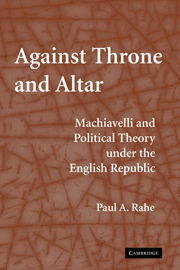Book contents
- Frontmatter
- Contents
- Acknowledgments
- Abbreviations and Brief Titles
- Introduction
- Prologue: Machiavelli in the English Revolution
- PART I MACHIAVELLI'S NEW REPUBLICANISM
- PART II REVOLUTIONARY ARISTOTELIANISM
- 3 The Classical Republicanism of John Milton
- 4 The Liberation of Captive Minds
- PART III MACHIAVELLIAN REPUBLICANISM ANGLICIZED
- PART IV THOMAS HOBBES AND THE NEW REPUBLICANISM
- Epilogue
- Index
3 - The Classical Republicanism of John Milton
Published online by Cambridge University Press: 21 July 2009
- Frontmatter
- Contents
- Acknowledgments
- Abbreviations and Brief Titles
- Introduction
- Prologue: Machiavelli in the English Revolution
- PART I MACHIAVELLI'S NEW REPUBLICANISM
- PART II REVOLUTIONARY ARISTOTELIANISM
- 3 The Classical Republicanism of John Milton
- 4 The Liberation of Captive Minds
- PART III MACHIAVELLIAN REPUBLICANISM ANGLICIZED
- PART IV THOMAS HOBBES AND THE NEW REPUBLICANISM
- Epilogue
- Index
Summary
At no time did John Milton allow the thinking of Niccolò Machiavelli to shape in any fundamental way the manner in which he wrote about, defended, and surreptitiously tried to guide the nascent English republic in strictly political affairs. To be sure, in 1651–1652, when he worked his way through the Discourses on Livy, he at first found attractive the fierce populism of the Florentine, and in his Commonplace Book he pointed with approbation to the crucial chapter in which Machiavelli distinguishes his republicanism from that of the ancients by attacking Livy, “all the other historians,” and “all the writers” of earlier times for their presumption that moral and political virtue are difficult but nonetheless possible to attain and that more is, therefore, to be expected from the educated and accomplished few than from the vulgar crowd. But Milton soon changed his mind – and, even at this time, he was inclined to shy away from the Florentine's contention that republics devoted to imperial expansion are far more likely to be viable than those satisfied with what they already have. Moreover, at no time did he embrace the fundamental premise on which the Florentine grounded this rejection of the classical republican principle of differential moral and political rationality. Nowhere did he echo the dictum that a legislator must presuppose that “all men are wicked and that they will make use of the malignity of their spirit whenever they are free and have occasion to do so.”
- Type
- Chapter
- Information
- Against Throne and AltarMachiavelli and Political Theory Under the English Republic, pp. 104 - 138Publisher: Cambridge University PressPrint publication year: 2008



